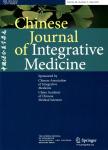Observational Study of Chinese Medicine Syndrome Distribution in Patients with Acute Myocardial Infarction and Its Impact on Prognosis
Observational Study of Chinese Medicine Syndrome Distribution in Patients with Acute Myocardial Infarction and Its Impact on Prognosis作者机构:Department of CardiologyZhongshan HospitalFudan UniversityShanghai (200032)China Department of Integrated Traditional and Western MedicineZhongshan HospitalFudan UniversityShanghai (200032)China
出 版 物:《Chinese Journal of Integrative Medicine》 (中国结合医学杂志(英文版))
年 卷 期:2019年第25卷第11期
页 面:825-830页
核心收录:
学科分类:10[医学]
基 金:Supported by the National Basic Research Program of China(No.2012CB518605) Science and Technology Innovative Program of Shanghai,China(No.10DZ1975400)
主 题:acute myocardial infarction Chinese medicine syndrome prognosis
摘 要:Objective: To investigate the distribution of Chinese medicine (CM) syndrome in patients with acute myocardial infarction (AMI) on admission and its impact on prognosis. Methods: A total of 525 AMI patients were prospectively recruited and classified into 4 groups based on their clinical characteristics: excess-heat, excess-cold, deficiency-heat and deficiency-cold syndromes. Major adverse cardiovascular events (MACEs) were followed up. Results: The excess syndrome was more common than deficiency syndrome (72.95% vs. 27.05%;P0.05). Totally 495 (94.29%) of 525 AMI patients were followed up (median 277 days). There were 59 (11.92%) MACEs. After adjusted with confounding factors in Cox regression models, the hazard ratio (95% confidence interval) of excess-heat, excess-cold, deficiency-heat and deficiency-cold syndrome groups were 1, 1.25 (0.63, 2.49;P0.05), 2.37 (1.14, 4.94;P0.05), 3.76 (1.71, 8.28;P0.05), respectively. Conclusions: Excess syndrome was more common in AMI patients and had better prognosis, while deficiency-cold syndrome had the poorest prognosis. CM syndrome was of value in predicting long-term outcomes in AMI patients.



